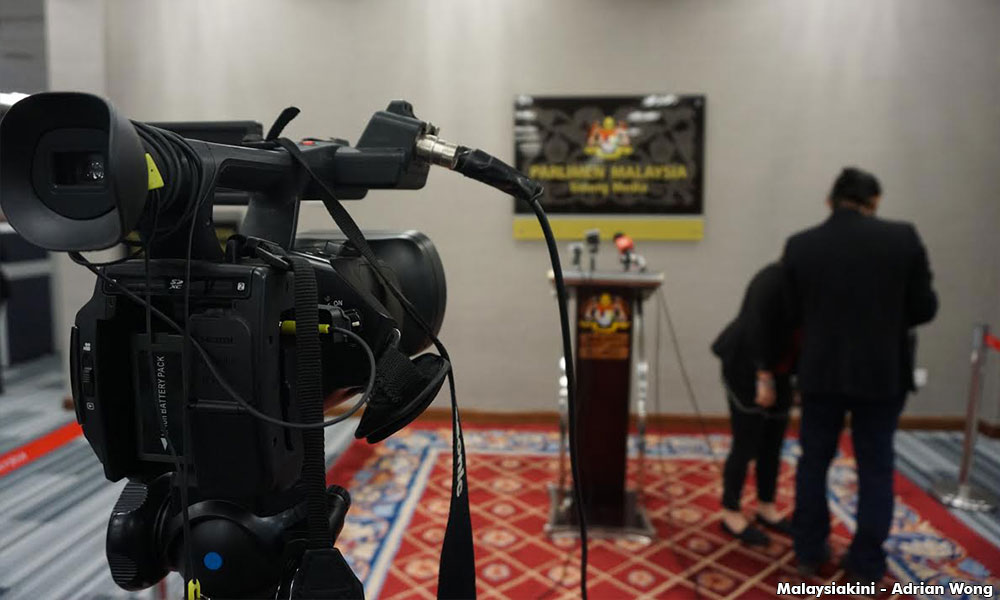The decision by the cabinet to advise the Yang di-Pertuan Agong that there will be no parliamentary sitting during the emergency is perplexing, to say the least.
This decision was communicated by de facto law minister Takiyuddin Hassan at a press conference this week. The Kota Bharu MP said that Parliament has been “[…] postponed on legal grounds to enable the government to combat the Covid-19 pandemic more effectively.”
He was reported to have said that the government did not want to expose members of parliament to unnecessary risks as many of them fell in the high-risk group for Covid-19.
According to him, out of the 220 MPs, 77 are aged 61 to 69, 19 are between 70 and 79, and four are aged 80 and above.
“So, we do not want to expose them to (possible) Covid-19 infection by being in a confined area which is narrow and closed."
Apparently, these decisions were made based on "facts and data".
To put his statements in context, the palace had issued a statement last week to say that the Agong was of the view that Parliament may convene during the emergency, based on the advice of the prime minister.
For the record, section 14(1)(b) of the Emergency (Essential Powers) Ordinance 2021 provides that, “For as long as the emergency is in force, the Parliament shall be summoned, prorogued and dissolved on a date as the Yang di-Pertuan Agong thinks appropriate.”
The provision in the said Emergency Ordinance is silent on whether the king has the discretion to summon, prorogue or dissolve Parliament during the emergency.
However, since the ordinance does not specifically oust or amend Article 40 of the Federal Constitution, which provides that the Agong shall act in accordance to the advice of the cabinet or specific ministers except for certain clearly defined circumstances, the Agong's’s discretion in the ordinance is still subject to Article 40.
In other words, the Yang di-Pertuan Agong does not have the discretion to summon, prorogue or dissolve Parliament on His Royal Highness’ own volition. He must act according to the advice of the cabinet.
Allow virtual sessions
Be that as it may, the cabinet has decided not to advise the Agong to convene Parliament during the emergency. As mentioned at the start of this article, the reasons given are most perplexing.

Almost all sectors have been allowed to operate during this emergency, including spas, foot reflexology centres, cinemas and pasar malam. There is no reason why Parliament cannot be allowed to sit.
This is not to say that these sectors should be closed. If the situation has improved, these economic sectors should be allowed to operate. The same goes for Parliament.
The reason given that there are a lot of older MPs who are more vulnerable to the virus also does not make sense. MPs have already been given the first dose of the vaccine. Also, there is no age prohibition in terms of participation in the above mentioned economic sectors either.
Strict SOPs can be implemented in order to ensure that there will be no Covid-19 infections while Parliament sits. The previous SOPs can be improved upon if need be.
In fact, the government can even think of amending the laws and necessary Standing Orders by way of the Emergency Ordinance to allow for virtual parliamentary sessions. These amendments would be temporary, while the emergency is in operation.
Takiyuddin was also reported to have said there was no need for Parliament to be in session during an emergency as the Agong could make ordinances as provided for under Article 150 (2B) of the Federal Constitution.
With due respect, Parliament’s role is not limited to just making laws. Parliament’s role is to serve as a check and balance to the executive. Without this role, Parliament is effectively ‘emasculated’, as eloquently put by the deputy speaker of the Dewan Rakyat, Azalina Othman.
It is clear that none of the reasons given by the government holds much water. It is no wonder that many have deduced that the government’s refusal has nothing to do with the pandemic but, rather, is due to political reasons.
If so, it would be a tragedy that the ordinances are used for such a purpose.
SYAHREDZAN JOHAN is a civil liberties lawyer and political secretary to Iskandar Puteri MP Lim Kit Siang. - Mkini
The views expressed here are those of the author/contributor and do not necessarily represent the views of MMKtT.




No comments:
Post a Comment
Note: Only a member of this blog may post a comment.